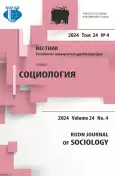Synergistically complex social well-being: The trust factor
- Authors: Kravchenko S.A.1,2
-
Affiliations:
- Moscow State University of International Relations
- Institute of Sociology of FCTAS RAS
- Issue: Vol 24, No 4 (2024)
- Pages: 895-905
- Section: Theory, Methodology and History of Sociological Research
- URL: https://journal-vniispk.ru/2313-2272/article/view/323166
- DOI: https://doi.org/10.22363/2313-2272-2024-24-4-895-905
- EDN: https://elibrary.ru/QLEMYP
- ID: 323166
Cite item
Full Text
Abstract
In recent decades, the social has acquired a synergistically complex nature (N.I. Lapin), which is caused both by objective determinants of the dynamic development of social, natural and technological realities, potentially increasing the production of various goods and services, and by subjective meanings of the quality of life - in their materialization, an increasing role belongs to the trust factor. Its study is determined by the civilizational crisis of trust, and its underlying causes are rooted in the formation of a qualitatively new “order out of chaos” (I. Prigogine) and in the staging of “mythical narratives” of the desired, “idealized” social well-being (J. Alexander), the false meanings of which destroy traditional values and dehumanize social relations. Under such challenges and scientific approaches to their analysis, the author designs a nationally oriented model of synergistically complex social well-being, based on the system of trust rooted in the genotype of national culture. This model includes the functional basic institutional structures of society, reproduction of traditional values of interpersonal trust, and implementation of humanistically oriented modernization. Under disequilibrium, risks and vulnerabilities, these components ensure the viability and sustainability of this type of well-being. For its sociological diagnostics, humanistically oriented interdisciplinarity is proposed, organically including both new theories of chaos, complexity and nonlinearity, and humanistic concepts of the sovereign national sociology.
About the authors
S. A. Kravchenko
Moscow State University of International Relations; Institute of Sociology of FCTAS RAS
Author for correspondence.
Email: sociol7@yandex.ru
доктор философских наук, профессор кафедры социологии Московского государственного института международных отношений (университета) Министерства иностранных дел Российской Федерации; главный научный сотрудник Института социологии Федерального научно-исследовательского социологического центра Российской академии наук Vernadskogo Prosp., 76, Moscow, 119454, Russia; Krzhizahanovskogo St., 24/35-5, Moscow, 117218, Russia
References
- Alexander J.C. The Drama of Social Life. Cambridge; 2017.
- At the Turn of the Century: Sociodynamics of Russian Culture. M.K. Gorshkov, S.N. Komissarov, O.I. Karpushin. Moscow; 2022. (In Russ.).
- Baudrillard J. The Spirit of Terrorism. There Was No War in the Gulf. Ripoll Classic; 2016.
- Bauman Z. Liquid Fear. Cambridge; 2006.
- Bauman Z. Collateral Damage. Social Inequalities in a Global Age. Cambridge; 2011.
- Bauman Z. Liquid Modernity. Cambridge; 2006.
- Bauman Z. Liquid Times. Living in an Age of Uncertainty. Cambridge; 2009.
- Beck U. The Metamorphosis of the World. Cambridge; 2016.
- Durkheim E. The Division of Labor in Society. New York; 1997.
- Foucault M. Archaeology of Knowledge. Saint Petersburg; 2004. (In Russ.).
- Fukuyama F. Trust: Social Virtues and the Path to Prosperity. Moscow; 2008. (In Russ.).
- Giddens A. The Politics of Climate Change. Cambridge; 2009.
- Giddens A., Pierson S. Conversation with Antony Giddens. Making Sense of Modernity. Cambridge; 1998.
- Habermas J. Communication and the Evolution of Society. Boston; 1979.
- Habermas J. The Theory of Communicative Action. Vol. 1. Reason and Rationalization of Society. Boston; 1984.
- Kravchenko S.A., Svirskaya D.A. The becoming of complex fears among the youth: Reflection through the prism of the genotype of national culture. Sociological Science and Social Practice. 2024; 12 (2). (In Russ.).
- Kravchenko S.A. Demand for a humanistic turn in sociology. Sociological Science and Social Practice. 2013 (3). (In Russ.).
- Kravchenko S.A. Geopolitical challenges and national sociology. Sociological Studies. 2023; 2. (In Russ.).
- Kravchenko S.A. Social and cultural dynamics of food: Acquisitions and vulnerabilities. Sociological Studies. 2015; 1. (In Russ.).
- Lapin N.I. Complexity in the Formation of new Russia. Anthropo-Socio-Cultural Approach. Moscow; 2021. (In Russ.).
- Lash S., Urry J. The End of Organized Capitalism. Cambridge; 1987.
- Luhmann N. Trust and Power. Cambridge; 2017.
- Mannheim K. Ideology and utopia. Diagnosis of Our Time. Moscow; 1994. (In Russ.).
- Misztal B.A. Trust: Acceptance of precaution against and cause of vulnerability. M. Sasaki, R.M. March (Eds.). Trust: Comparative Perspectives. Boston; 2012.
- Prigogine I. The End of Certainty. New York; 1997.
- Prigogine I., Stengers I. Order Out of Chaos: Man’s New Dialogue with Nature. London; New York; 2018.
- Puzanova Zh.V., Larina T.I., Tertyshnikova A.G. Infantilization of the youth: A methodological approach to measurement. RUDN Journal of Sociology. 2021; 21 (3). (In Russ.).
- Sociological Approaches to the Study of Social Well-Being. Moscow; 2021. (In Russ.).
- Stepin V.S. Globalization and dialogue of cultures: Value issue. Century of Globalization. 2011; 2. (In Russ.).
- Stepin V.S. Foundations of Science and Their Sociocultural Dimension. Moscow; 1996. (In Russ.).
- Stepin V.S. Types of scientific rationality and synergetic paradigm. Complexity. Reason. Post-Non-Classic. 2013; 4. (In Russ.).
- Sztompka P. Society in Action: A Theory of Social Becoming. Cambridge; 1991.
- Toshchenko Zh.T. Precariat: From Proto-Class to New Class. Moscow; 2018. (In Russ.).
- Toshchenko Zh.T. Main meanings of Russians’ life world. Russians’ Life World: 25 Years Late (Late 1980s — Mid-2010s). Moscow; 2016. (In Russ.).
- Urry J. Mobilities. Cambridge: Polity Press; 2008.
- Urry J. Climate Change and Society. Cambridge; 2011.
- Urry J. Global Complexity. Cambridge; 2003.
- Weber M. Sociology of Religion. Boston; 1993.
Supplementary files









